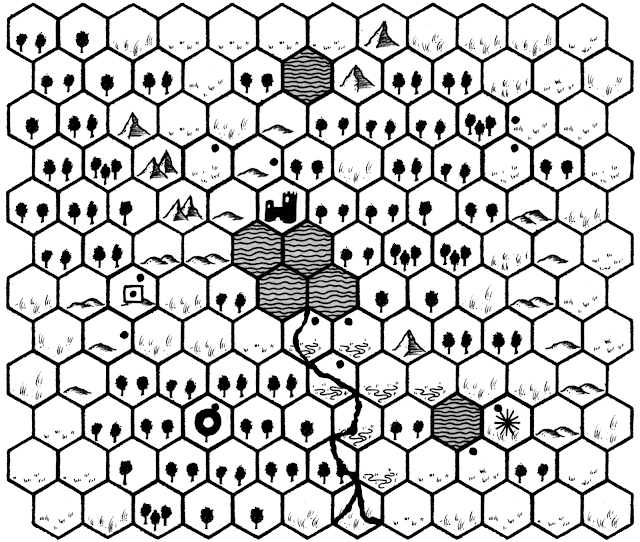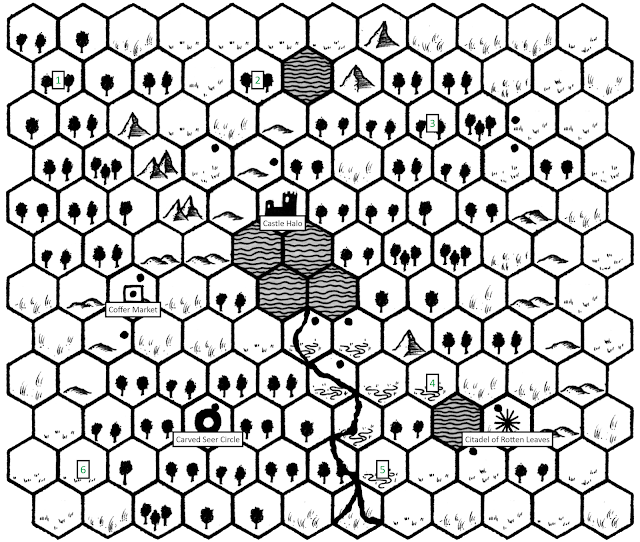Last week I wrote about how I was prepping for my Primeval Bastionland playtest (which went
well!). In particular, how I wanted a world that felt real, like it existed
outside of the players, but didn't require reams of prepared notes and detailed
maps.
An IRON SKELETON of truths, fleshed out in broad
strokes, and plenty of procedures and tables on hand to improvise to fill the gaps.
(this analogy was more gross and organic on the first draft,
so I decided to make it absurd instead)
Not quite fully emergent improvised play, not quite full-on
blorb.
The Iron Skeleton is immutable. If you put a castle
on the map that castle isn't moving anywhere unless that's its whole thing.
The Broad Strokes are firm but flexible. You can
choose the route to take, but the direction is mostly set.
The Gaps are wide open. Freeing but daunting.
Really it's the "filling the gaps" part which can
be the trickiest, and the one that I've heard most people struggling with. As
such, consider this post to be a hodgepodge of thoughts I've had around running
filling those gaps, especially in the context of Primeval Bastionland.
Also we're in an apocalyptic heatwave over here, and as our
homes are generally built to retain heat I've gone to work in a local
co-working space, which was boasting about it's AC and cold drinks.
It also happens to be a pub, but what choice did I have?
No, the pub is not called THE IRON SKELETON but I wish it was.
IMPARTIALITY
As I wrote in that patching post,
improvisation can feel arbitrary if you're too generous or too strict. I've
played in games where it felt like we could convince the GM of just about
anything, making success just a case of thinking of something cool. We
definitely had fun, but I didn't feel challenged or satisfied.
It's an old one, but I think it's really worth sitting down
with new players and telling them that your role is to be impartial, and
while you're not out to get them, and you want everybody to have fun, you're
also not going to hand their characters success on a silver platter. Note that
this is absolutely not mutually exclusive with being a friendly,
welcoming host for the game and having fun at the table.
PROCEDURES WITHOUT ROLLS
Lots of procedure
talk going around lately. It's easy to think that procedures have to
involve rolls, and while they absolutely can it's often those that don't which
really open up the possibilities when improvising.
Part of the reason I like these is that they can give you
mechanical permission to be more generous or punishing than you would normally
feel appropriate.
I know, the GM can do anything, right? You don't need a rule
to tell you what's allowed! Well, like I mentioned above in Impartiality,
sometimes it helps to stay within a certain range until you're given a nudge by
the game.
To look at Primeval Bastionland, the Running the Game page
sets clear guidelines for when the players Succeed or Fail at an action. When
they fail you're prompted to create a new problem, escalate an existing
problem, or deliver on a hanging threat. Now go wild.
Are guidelines procedures? I'll let somebody else write a
blogpost debating that.
Heed the direction of the procedures, and don't be afraid to
deliver big impact when they prompt it.
ORACULAR POWER
I've written before about Cheap Tricks
that a GM can use in their game.
But check this out... Dice are the cheapest trick of all.
When you roll these things, or get the players to roll, it's
like you're invoking the power of fate, absolving yourself of all
responsibility.
Throw ten dragons at your players while they're travelling
and you'll get a bad reputation.
Put ten dragons on the encounter table? Now when the players
roll that encounter their fear is directed at the world instead. What kind of
place has 10 Dragons as a wandering encounter? Let's get out of here!
Well, you might get some protests...
But the point is that this
power is yours to wield. When you roll on a Spark Table you're both
restricting yourself to ideas that grow from the result, but freeing yourself
to interpret the result in a more impactful way than you might normally feel is
fair.
If I roll Death/Lizard then you can't really blame me when the encounter is some highly venomous reptile. If I'd pulled that out of thin air then you might wonder if I'm out to get you.
GM AS MEDIUM
Similar to impartiality, I like to think of the GM as a
medium between the players and the world.
The players speak and I translate that into worldtongue,
making an impact on the world, calling for a roll if necessary.
The world speaks to me through notes, procedures, rolls, and
I translate that back to the players.
It should never really feel like I'm telling the players
what I think should happen, and likewise I should avoid changing the world as
written based on my own decisions, only those of the players. To me, a great GM
isn't one that leaves the players fawning over their skills, but one that
leaves the players in love with their world.
This leads nicely to...
PRIMACY OF ACTION
This is a new addition to Primeval. It goes like this:
Even when using the rules for travel, exploration, and
combat, remember this, the most important thing.
No rule or system within the game should override the
Actions the players take.
Remember the core of giving players information,
honouring their choices, and describing the impact of their actions.
So a Knight is off doing a Task, let's say they're searching
for a vantage point to get a good view of the Hex.
They fluff their roll, so I figure they hit a Complication.
Sure, you could pick a random Complication Element as
inspiration, but what about that Hunter who the Knight thoroughly humiliated
just yesterday? Do we think they'd be seeking revenge? They live around these
woods, right? Should we just have them show up looking for revenge?
Now I don't think this counts as illusionism.
That idea is primarily based around protecting player agency, and here we want
to increase that agency.
We didn't pre-plan an encounter with the angry hunter and
force the players into it. Instead the player's past action (humiliating the
hunter) combined with their present action (hitting a complication in the
woods) to present an opportunity to show the lasting impact of their decisions.
Of course you can go too far. If you travel to a remote land
and that old enemy just so happens to be there, it might feel contrived,
so always do a quick check to make sure the previous and current actions line
up convincingly.
Hope this is useful if you're hitting similar snags when "filling the gaps".
HAIL THE IRON SKELETON.
-----------------------------------------------------------------------------------
This post was originally sent as a reward to all Patreon supporters, and is released freely on this site the week after its original publication.
If you want to support my blog, podcasts, and video content then head over to my Patreon.





